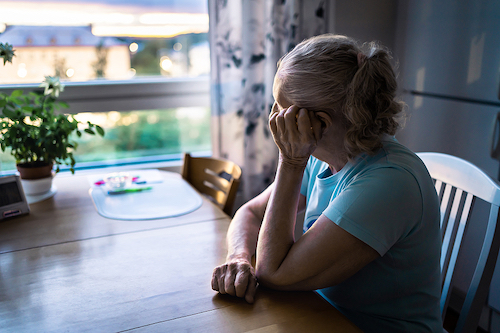 Rates of prolonged grief disorder are likely to be higher than before the COVID-19 pandemic.
Rates of prolonged grief disorder are likely to be higher than before the COVID-19 pandemic.
Researchers from the UK found that rates of prolonged grief disorder are already three times higher than pre pandemic.
“The COVID-19 pandemic was not only a global medical emergency; it also had an extraordinary impact on people's experiences of bereavement. More people were bereaved, in more distressing circumstances, and social distancing meant people couldn’t be visited or comforted by family and friends, limiting how we could console and support one another,” Dr Lucy Selman, co author of the study and an Associate Professor from the Palliative and End of Life Care Research Group and the Centre for Academic Primary Care at the University of Bristol told Theravive.
“When our study began in 2020, death rates due to COVID-19 were climbing across Asia and Europe, and social restrictions were being widely imposed. But it was impossible to know then how the pandemic would affect people’s experiences of bereavement over time. We wanted to understand more about the impact that these experiences have had on people, including how coping with and adjusting to a bereavement during the pandemic might be different to non-pandemic times. As far as we are aware, this is the first published longitudinal study of bereavement during the Covid-19 pandemic.”
Prolonged Grief Disorder is a mental health condition that develops following the death of someone close. It occurs most commonly when the death was abrupt or violent.
The researchers surveyed 711 in the UK who were bereaved between March 2020 and January 2021. They then followed up with the same people 13 and 25 months following their bereavement.
“In our study, over three times as many people were showing signs of Prolonged Grief Disorder 13 months after the death of a loved one during the pandemic, than would have been expected during pre-pandemic times. We identified a number of factors strongly associated with an increased likelihood of experiencing Prolonged Grief Disorder, including unexpected deaths, social isolation and loneliness in early bereavement, and a lack of social support over time,” Selman said.
“Feeling well supported by healthcare professionals following the death was associated with reduced levels of prolonged grief symptoms – so the support that professionals provide around the time of the death makes an important difference to processing a bereavement. The research also found that people with lower levels of formal education were more likely to experience symptoms of Prolonged Grief Disorder, suggesting poor outcomes among people experiencing social disadvantage.”
Prior to the pandemic, estimates suggest roughly 10% of people who are bereaved experience prolonged grief disorder. During the pandemic, more than 35% of people surveyed met the criteria for prolonged grief disorder at 13 months following their bereavement. 29% of people met the criteria 25 months following their bereavement.
In the United States, more than 1 million deaths from COVID-19 have been reported to the World Health Organization.
Experts say that represents a potentially massive increase in the number of people dealing with prolonged grief disorder.
Whilst grief is a natural emotional following the loss of a loved one, a grief that persists and causes problems with everyday life may indicate prolonged grief disorder.
Symptoms may include feelings of disbelief about the death, feeling as if a part of oneself has also died, intense emotions like anger, bitterness and sorrow, avoidance of any reminder that the person has died, difficulties planning for the future, problems engaging with friends, feeling emotionally numb, feeling that life is meaningless and feelings of intense loneliness.
“Prolonged grief disorder or complicated grief is when intense, long-lasting symptoms of grief, together with ongoing problems and difficulties in coping with life, go on for more than six months after someone dies. So, if you are feeling stuck in your grief for many months, not coping with life, not enjoying life and feeling really difficult feelings that don’t seem to be getting any better, you might be experiencing PGD,” Selman said.
“Our study demonstrated the extraordinary challenges of bereavement during the pandemic in the UK, including the restrictions around end-of-life care, disruptions to mourning practices, social-support networks and coping mechanisms, and the effects these challenges have had on bereaved people. Results on this analysis suggest higher than expected levels of PGD compared with pre-pandemic times, with important implications for bereavement policy, provision and practice now (e.g., strengthening of social and specialist support) and in preparedness for future pandemics and mass-bereavement events (e.g., guidance on infection control measures and rapid support responses).”
Elizabeth Pratt is a medical journalist and producer. Her work has appeared on Healthline, The Huffington Post, Fox News, The Australian Broadcasting Corporation, The Sydney Morning Herald, News.com.au, Escape, The Cusp and Skyscanner. You can read more of her articles here. Or learn more about Elizabeth and contact her via her LinkedIn and Twitter profiles.